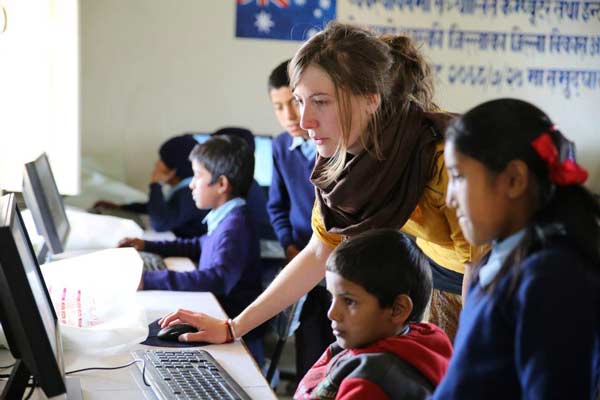
We introduce volunteer teachers where we are invited by communities to find ways of bringing sustainable benefit to children’s education.
The focus is on placing international teachers in rural public primary and lower secondary schools, but we have also been involved in teaching in other domains such as professional development for local teachers and community vocational training. Most of the efforts of volunteers have been directed towards helping to improve study and English communication skills of students which is highly valued by parents and teachers.
Benefits for volunteers
Volunteers have had the opportunity to challenge preconceived ideas and training about what constitutes the ‘best’ pedagogical methods and identify simple, powerful and ‘appropriate’ ways of teaching in Nepal that engage and resonate positively with students and their teachers.
Volunteers have also been encouraged to commit: to working under the direction of the school Principal; to working in close collaboration with local teachers and learn appropriate teaching techniques from each other; and, to follow the local curriculum.
The program aimed for excellence in three core areas:
1. Positive and lasting impact on schools, their students and teachers.
2. The professional and personal development of participants.
3. Meeting our development objectives so we can grow our program of assistance to underserved communities.
Details about the Pathway Program
Read about our program for attracting suitably qualified volunteers to help teach in Nepal.
Pathways ProgramProfessional involvement
The program accepts only suitably qualified people who have the necessary training and experience that will allow them to contribute to the teaching objectives of the school. Most teaching volunteers were education students in the final years of university or were professionals with experience.
Consultation
There was a strong community consultation and review process. School exam results and interview of volunteers, children and local teachers were collected and assessed to ensure that the program was having a positive effect and to further improve the program.
Knowledge database
The outcomes and collective experiences of participants were used to build a knowledge base for the benefit of future participants.
Local capacity
The program did not detract from the important work of building local teaching capacity. We encouraged ways of integrating the efforts of volunteers with those of local teachers with the view to having a positive influence that will continue long after volunteers have departed.



